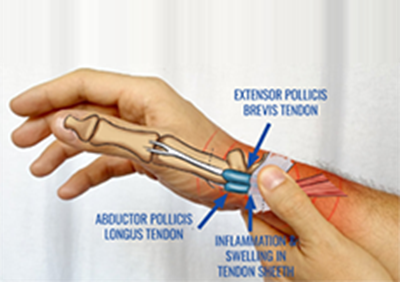The Most Common Cause of De Quervain's Tenosynovitis
posted by Karin Hogge on Friday, April 22, 2022
OUCH! THAT HURT! WHAT DID I DO TO MY THUMB/WRIST?
Have you ever wondered, what did I do to my thumb/wrist last night in my sleep? You woke up this morning and now you can’t open a jar, open a door, can’t lift your child, can’t wash your hair, can’t pick up or hold your cell phone, and many more routine tasks because now your thumb and wrist hurt.
You might be suffering from an overuse of two tendons in your thumb that cross into the wrist. Those tendons go through a tunnel and with repetitive motion, the tunnel becomes inflamed, which makes the opening smaller for the two tendons to slide through and results in swelling and pain. Sometimes people develop a small fluid-filled cyst near the base of the thumb side of your wrist that also becomes painful.
de Quervain’s Tenosynovitis: Inflammation of two tendons and their sheath that control the movement of the thumb.

The most common cause of de Quervain’s Tenosynovitis is a chronic overuse of the wrist that results in pain at the base of the thumb. The motion that flares the symptoms up is bending the wrist down/up in a position where your thumb is outstretched as well. Some examples could be simply holding your cell phone or a book, raking leaves, garden work, digging in flower beds/gardens, picking up a baby, throwing darts, casting a fishing line, etc.
If you are experiencing those symptoms, some things you can do at home to provide relief include applying ice to the area for no more than 10-15 minutes, rest, and do not use your thumb/wrist for repetitive tasks. If your symptoms don’t resolve within a week, it is best to contact your family physician for a referral to an Occupational Therapist for hand therapy. The therapist will teach you specific exercises to aid in your recovery; will provide recommendations for modifying your activities; and may custom fit you with the correct type of splint that will allow the tendons to rest. The most important goal is to reduce inflammation and pain so help you return to your regular activities as quickly as possible. We would be happy to provide our expertise in getting you on the road to recovery sooner.
For additional questions, please contact Spencer Hospital Rehabilitation Services at (712) 264-6189.
- rehab
- therapy